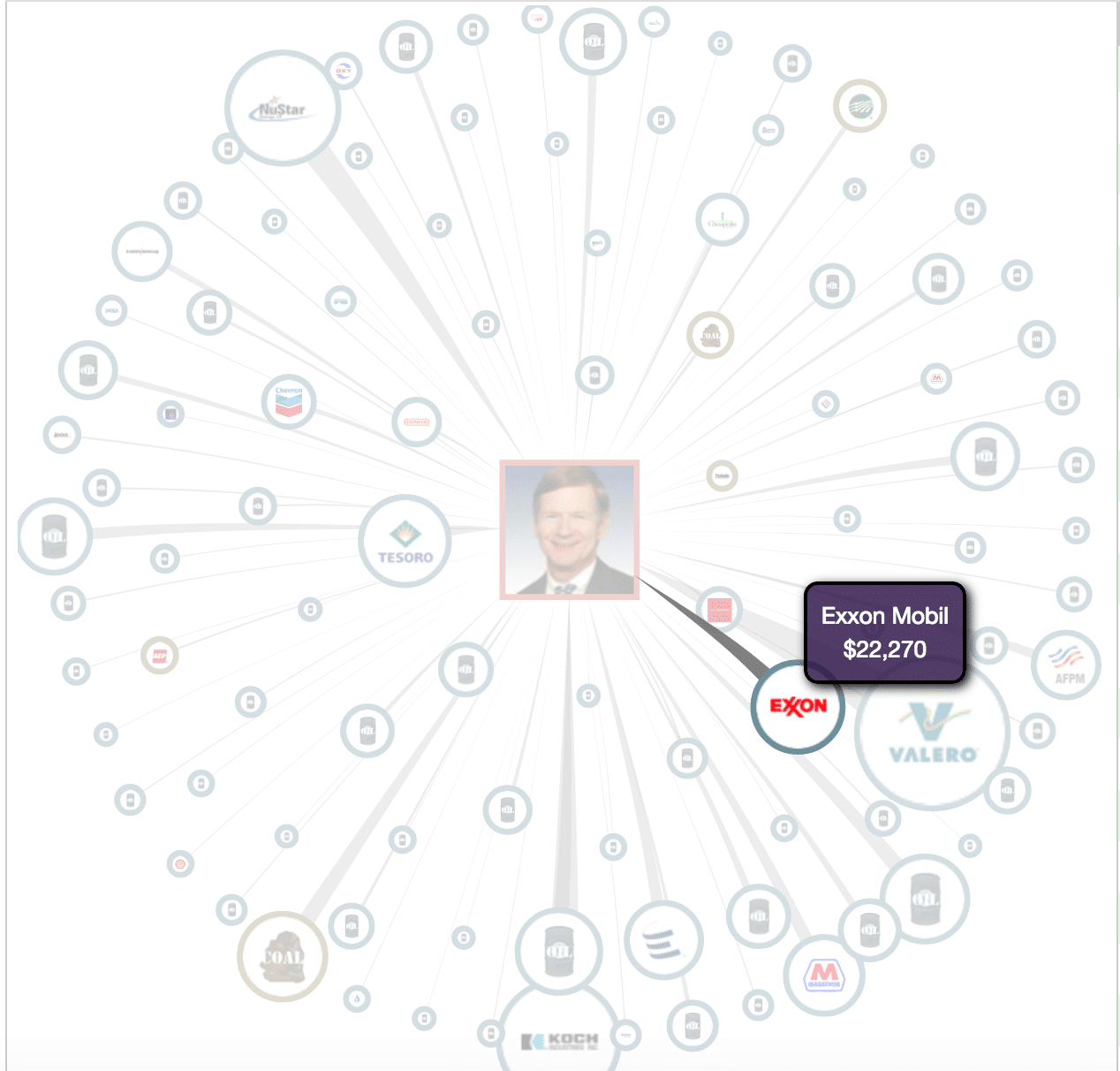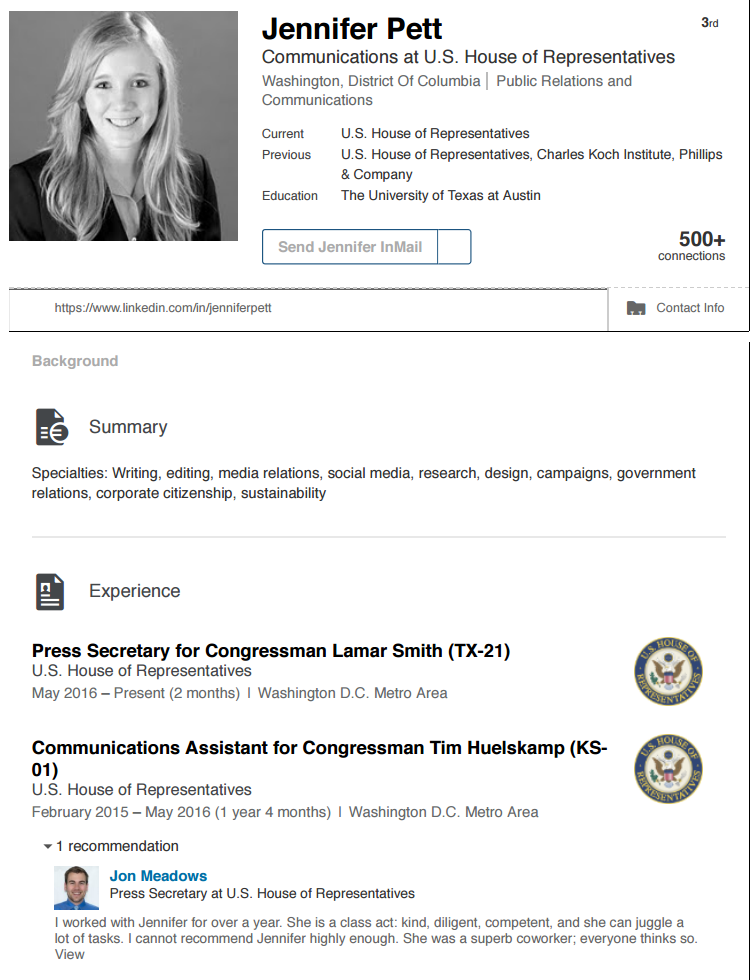U.S. Rep. Lamar Smith recently caused a ruckus by targeting environmental groups that are pushing for ExxonMobil to be held accountable for funding climate change denial despite their deep internal corporate knowledge of the role of fossil fuel pollution in global warming. Rep. Smith penned letters to several environmental groups and foundations requesting all of their communications about the ongoing “Exxon Knew” campaign.
Some of the groups and foundations have issued public responses refusing to provide the materials to Smith, who heads up the U.S. House Science, Space, and Technology Committee.
Not yet reported, though, are the extensive ties — monetary and personnel — binding Smith to the crucial corporate funders of climate denial: ExxonMobil and Koch Industries.
According to Oil Change International’s Dirty Energy Money database, Smith has taken $22,270 in campaign contributions from Exxon since 1998. And OpenSecrets.org data reveals that $19,500 of the Exxon money has flowed to Smith’s campaign since 2008 alone.
OpenSecrets.org data reviewed by DeSmog also shows that Smith has taken $52,000 in campaign contributions from Koch Industries — another key node of the climate denial machine — since 2006.
All told, Lamar Smith — a climate change denier — has received $675,597 from the oil and gas industry since 1998.
Koch-Exxon-Smith Revolving Door
Beyond campaign finance money, the bigger story here is the people working for Smith, both past and present.
Let’s start with Jennifer Pett — Smith’s communications director — who formerly served as a Charles Koch Institute media relations associate.
Image Credit: LinkedIn
Pett transitioned from that job to work as a communications assistant for U.S. Rep. Tim Huelskamp (R-KS), whose congressional district sits in the same state as Koch Industries’ headquarters. Since joining Congress in 2012, Huelskamp has received $40,900 from Koch Industries, his top campaign contributor.
Further, Lamar Smith’s senior legislative aide, Scott Ferguson, went on two trips funded by the American Exploration and Production Council, one in 2014 and one in 2015. One of the Council’s members is XTO Energy, the hydraulic fracturing (“fracking”)-focused subsidiary of ExxonMobil.
What former Smith staffers have gone on to do with their careers is also telling, emblematic of the government-industry revolving door.
Smith’s former communications director, Sally-Shannon Birkel, now serves as senior manager of media relations for the U.S. Chamber of Commerce, which is funded by both the Kochs and ExxonMobil. Karen Harbert, the president of the Chamber’s Institute for 21st Century Energy, has called the ongoing state-level Attorneys General investigation into ExxonMobil and climate denial “un-American.”
“The idea that a group of attorneys general can get together and decide to collaborate and corroborate, to persecute not just a single company now but an industry, because they are ideologically opposed to the product it produces, is un-American,” said Harbert. “It is a threat to the free enterprise system; it is a threat to the rule of law on which the free enterprise system depends; and we’re not going or stand for it.”
Another former Smith communications director, Brad Bennett, left Smith’s office and eventually transitioned into gigs at both Hill and Knowlton (a PR firm with roots in tobacco industry denial tactics which did PR on behalf of America’s Natural Gas Alliance, ANGA) and DCI Group, the latter of which has key Exxon ties and was subpoenaed in April by the Attorney General of the U.S. Virgin Islands in the Attorneys General probe.
Jennifer Young Brown, Smith’s senior advisor for the Science, Space, and Technology Committee and his former long-time chief-of-staff, also has a key Koch link. As a young staffer back in 2000, she attended a retreat hosted and funded by the George Mason University-based Mercatus Center. The Center for Public Integrity has described Mercatus’ annual congressional staffer retreats as a key influence-peddling avenue for the Kochs’ political agenda.
The Koch-funded Competitive Enterprise Institute, like DCI Group, received a subpoena from the U.S. Virgin Islands in April.
Lastly, Zachary Kurz — Smith’s former communications director for the Science, Space, and Technology Committee — now works as a public affairs specialist for Cause of Action, a legal activism group funded by the Koch-linked “dark money ATM of the right,” Donors Trust.
“Campaign…Is Working”
In a blog post published on May 20, Union of Concerned Scientists president Ken Kimmell pointed to the Smith-led Science, Space, and Technology Committee letters to NGOs and their funders as a victory of sorts, a data point displaying that the campaign to hold Exxon and other companies accountable for climate denial has struck a nerve.
“The campaign to hold companies accountable is working,” wrote Kimmell. “Some fossil fuel companies and their allies are no doubt feeling pressure, and they are pushing back. I would hate to think that the House Science Committee is using its governmental powers in aid of this effort. But whatever the motive for the letter, UCS will not be intimidated.”
Given the ties linking Smith’s political career to the very companies who have perpetuated and bolstered the climate denial machine like Koch and Exxon, it’s safe to say that indeed as Kimmell hinted at, “the House Science Committee is using its governmental powers in aid of this effort.”
Image Credit: DirtyEnergyMoney.org
Subscribe to our newsletter
Stay up to date with DeSmog news and alerts







